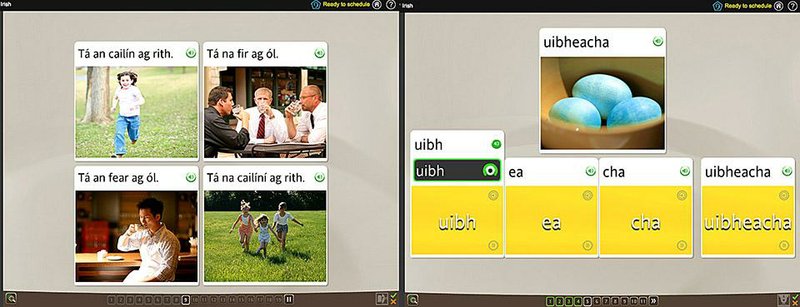Show of hands, who out there is planning a vacation to some gorgeous foreign location this year?
OK, put the hands down. I can't see them. But I'm willing to bet there's more than one person with a great trip planned.
where it’s @
Rosetta Stone requires a headset with a microphone for speech recognition and an online account. Online subscriptions provide unlimited web, smartphone or tablet access for three, six, 12 or 36 months ranging from $129-$499, though a current special reduces those prices from $99-$249. The CD version currently is reduced from $399 to $229 for three lesson levels or $179 for one level. More information is available at rosettastone.com.
Me, I'm more the wishful thinking type, but it never hurts to be prepared. I've learned a smattering of Spanish, French, Italian and German. Most of that happened in high school and college. It's a lot tougher to learn a language nowadays.
I decided to try a method that seems to be popular with students, adults and corporations. I tried the latest version of Rosetta Stone.
I wanted a real challenge, just to see if the software would work. So I chose what I thought would be a tough language to learn. I'm part Irish, a trip to Ireland is first on my bucket list, so of course, I had to go for Irish Gaelic.
Wow. I chose wisely.
This definitely was going to be a tough nut for Rosetta Stone to crack. In planning (OK, dreaming) of a trip to Ireland, I've downloaded an app or two to learn some Gaelic. I kept having the same thought: "How do you put those letters together and get that sound?"
Rosetta Stone doesn't start by explaining the letters or their sounds. It throws you headfirst into the language.
The software comes in a box CD set or runs through a Web browser and online app. A headset with a microphone is required to use the software.
I tested the online subscription version, which uses an online account to send lessons through your Web browser. It also can continue lessons on smartphones with free, downloadable apps for Android and iOS. The subscription provides unlimited access for three, six, 12 or 36 months.
Rosetta Stone offers several features within the overall program. The lessons are the main portion, but the webpage also includes links to chat with other subscribers, play games and even schedule a one-on-one conversation with a native speaker of the language.
The concept for Rosetta Stone is simple: instant immersion. Instead of starting by introducing the sounds of letters, it throws out words immediately and requires you to speak, match and understand the words. Then it moves to phrases and eventually sentences.
Rosetta Stone relies on three simultaneous methods for learning the language. First, you see the word as it is written. As the word is displayed, a native speaker says the word. At the same time, a photo is shown related to the word. Eventually, you must match the word with the photo.
After a few lessons, words become phrases, and verbs are introduced. Then verb tenses come into play, followed by pronouns. Finally, it's all put together into complete sentences. The sentences state what's in one of the photos, and you must match the sentence to the photo. With this method, you learn basic words and phrases, plurals and even negative tenses.
Rosetta Stone also concentrates on speaking the language as well as reading and understanding it. Reading and grammar lessons are interspersed with speech lessons. A native speaker reads the word or phrase, which must be said back correctly. The software grants some nice leeway on pronunciation at first, but it gets more sensitive as it progresses, expecting the participant to improve.
At first, it bothered me that I wasn't given the phonetic value, or sound, of the letters. With a language like Gaelic, which has letter combinations that create sounds very different from English, I figured knowing the phonetics would help. It also bothered me at times that new phrases would be introduced with words I didn't know or understand.
What I discovered was that as the lessons progressed, I figured out the new words, and even the new verb tenses. The more lessons I went through, the more it made sense. Of course, just when I knew I had it down, it threw more curveballs.
Rosetta Stone is very challenging, but it also seems to work. Granted, I'm not sure how often I'll need to say "the women are running" while on a tour of Ireland, but I have it available if I need it. I do know how to ask for some coffee, a sandwich and a newspaper. Really, what more do I need?
I guess it's time to do some serious planning for that trip.
SundayMonday Business on 01/26/2015
